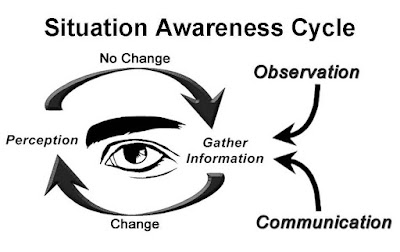Everyone starts with an initial perception of any given situation and then continuously updates it with new information. People gather information through both observation, which includes input from the senses, and communication, which includes face-to-face conversation, written communication, and radio or telephone exchanges.
Simply paying attention is an important part of maintaining good situation awareness, but even more important is determining what to pay attention to. All perceptions are subject to filtering and focusing: people constantly filter information and shift focus. People also produce a lot of internal inputs such as thoughts about what to do next, stress, memories of similar experiences, fear. Those with more experience in an environment often can more easily filter out distractions and unimportant details and focus on the most salient information.
[Click here to download a copy of Leading in the Wildland Fire Service.]


No comments:
Post a Comment
********
The WFLDP seeks to build and support an online community in which wildland fire professionals can interact.
We invite respectful discussion; however, the realities of online culture is such that anonymous posts and posts from children under the age of 13 are not accepted.
All comments are monitored by our editorial staff for appropriateness in meeting the mission of the WFLDP prior to posting to the blog. We do not discriminate against any views, but we reserve the right not to post comments.
Individuals posting comments are fully responsible for everything that they submit.
Comments submitted after hours and on holidays/weekends will be reviewed as early as possible the next business day.
Our complete blog policy can be found at http://www.fireleadership.gov/committee/reports/Blog_Policy_Jan2010.pdf.
A yellow box will appear after you submit your comment notifying you that your comment will be reviewed.